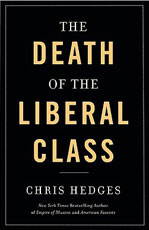"In a traditional democracy, the liberal class functions as a safety valve. It makes piecemeal and incremental reform possible. It offers hope for change and proposes gradual steps toward greater equality. It endows the state and the mechanisms of power with virtue. It also serves as an attack dog that discredits radical social movements, making the liberal class a useful component within the power elite," writes Chris Hedges, a fellow at the Nation Institute who spent nearly two decades as a foreign correspondent. He is the author of seven books including War Is a Force That Gives Us Meaning and Losing Moses on the Freeway. In this hard-hitting and enlightening work, Hedges laments the death of the liberal class in America. The liberals have sold out to the corporate world so that there is little or no difference between the two major political parties. Both are caught up in subservience to business and to militarism.
Hedges has no mercy for other professionals and progressives who have also sold out — members of the media, the church, the university, the arts, and the labor unions. Despite the rhetoric that got him elected, Barack Obama has backed corporate interests and done little to help the poor and the homeless. Worst of all is the obscene amount of money spent each day on two wars while unemployment surges. The U.S. spends an estimated $500,000 to $1 million per soldier or Marine per year in Afghanistan The ideals that the liberal class once espoused — a just health care system, an end to our permanent war economy, educational renewal, environmental reform, the protection of civil liberties — have all been tossed aside in favor of making life easier for the rich and the powerful.
Hedges locates the beginning of the downfall of the liberal class during the World War I era when the leviathan of total war was unleashed along with new forms of mass propaganda, the loss of thrift, the growing distrust of dissent, and the cultural embrace of simplification. It accelerated with the McCarthyism after World War II. The author then covers the social and political upheavals of the 1960s under the critical phrase "Politics as Spectacle." He returns to the contemporary scene and posits that the liberal class has closed its eyes to the breadth and depth of environmental and economic collapse.
On a more optimistic note, the author pays tribute to some of his spiritual heroes including Dorothy Day, Sydney Schanberg. Ralph Nader, I. F. Stone, Howard Zinn, Martin Luther King, Jr., and Malcolm X. At 87 years of age, Daniel Berrigan tells him: "This is the worst time of my long life. I have never had such meager expectations of the system. I see those expectations verified in their paucity and their shallowness every day I live."
Hedges is adamant that there is no hope in the present political system, and the passivity of the moribund liberal class will do nothing to save the world. He calls citizens to small acts of defiance against the status quo. It may not be enough to change things but at least it will signal that some people are still awake and fed up with way things are.
